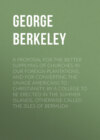Czytaj książkę: «A Proposal for the Better Supplying of Churches in Our Foreign Plantations, and for Converting the Savage Americans to Christianity, By a College to Be Erected in the Summer Islands, Otherwise Called the Isles of Bermuda»
A Proposal for the better Supplying of Churches in our foreign Plantations, &c
Although there are several excellent persons of the church of England, whose good intentions and endeavours have not been wanting to propagate the gospel in foreign parts, who have even combined into societies for that very purpose, and given great encouragement, not only for English missionaries in the West-Indies, but also, for the reformed of other nations, led by their example, to propagate christianity in the East: It is nevertheless acknowledged, that there is at this day, but little sense of religion, and a most notorious corruption of manners, in the English colonies settled on the continent of America, and the islands. It is also acknowledged, that the gospel hath hitherto made but a very inconsiderable progress among the neighbouring Americans, who still continue in much-what the same ignorance and barbarism, in which we found them above a hundred years ago.
I shall therefore venture to submit my thoughts upon a point, that I have long consider'd, to better judgments, in hopes that any expedient will be favourably hearkned to, which is proposed for the remedy of these evils. Now in order to effect this, it should seem the natural proper method, to provide, in the first place, a constant supply of worthy clergy-men for the English churches in those parts; and in the second place, a like constant supply of zealous missionaries well fitted for propagating Christianity among the savages.
For though the surest means to reform the morals, and soften the behaviour of men, be, to preach to them the pure uncorrupt doctrine of the gospel, yet it cannot be denied that the success of preaching dependeth in good measure on the character and skill of the preacher: Forasmuch as mankind are more apt to copy characters than to practise precepts, and forasmuch as argument, to attain its full strength, doth not less require the life of zeal, than the weight of reason; and the same doctrine, which maketh great impression, when delivered with decency and address, loseth very much of its force by passing through aukward or unskilful hands.
Now the clergy sent over to America have proved, too many of them, very meanly qualified both in learning and morals for the discharge of their office. And indeed little can be expected from the example or instruction of those, who quit their native country on no other motive, than that they are not able to procure a livelihood in it, which is known to be often the case.
To this may be imputed the small care that hath been taken to convert the negroes of our plantations, who, to the infamy of England, and scandal of the world, continue Heathen under Christian masters, and in Christian countries. Which cou'd never be, if our planters were rightly instructed and made sensible, that they disappointed their own baptism by denying it to those who belong to them:
That it would be of advantage to their affairs, to have slaves who should obey in all things their masters according to the flesh, not with eye-service as men-pleasers, but, in singleness of heart as fearing God: That gospel liberty consists with temporal servitude: and that their slaves would only become better slaves by being Christian.
And though it be allowed that some of the clergy in our colonies have approved themselves men of merit, it will at the same time be allowed, that the most zealous and able missionary from England must find himself but ill qualified for converting the American Heathen, if we consider the difference of language, their wild way of living, and above all, the great jealousy and prejudice which savage nations have towards foreigners, or innovations introduced by them.
These considerations make it evident, that a college or seminary in those parts is very much wanted; and therefore the providing such a seminary, is earnestly proposed and recommended to all those, who have it in their power, to contribute to so good a work. By this, two ends would be obtained.
First, the youth of our English plantations might be themselves fitted for the ministry; and men of merit would be then glad to fill the churches of their native country, which are now a drain for the very dregs and refuse of ours.
At present, there are, I am told, many churches vacant in our plantations, and many very ill supplied; nor can all the vigilance and wisdom of that great prelate, whose peculiar care it is, prevent this, so long as the aforesaid churches are supplied from England.
And supplied they must be, with such as can be pick'd up in England or Ireland, till a nursery of learning for the education of the natives is founded. This indeed might provide a constant succession of learned and exemplary pastors; and what effect this must be supposed to have on their flocks, I need not say.
Secondly, the children of savage Americans, brought up in such a seminary, and well instructed in religion and learning, might make the ablest and properest missionaries for spreading the gospel among their countrymen; who would be less apt to suspect, and readier to embrace a doctrine recommended by neighbours or relations, men of their own blood and language, than if it were proposed by foreigners, who would not improbably be thought to have designs on the liberty or property of their converts.
The young Americans necessary for this purpose, may, in the beginning be procured, either by peaceable methods from those savage nations, which border on our colonies, and are in friendship with us, or by taking captive the children of our enemies.
It is proposed to admit into the aforesaid college only such savages as are under ten years of age, before evil habits have taken a deep root; and yet not so early as to prevent retaining their mother tongue, which should be preserved by intercourse among themselves.
It is further proposed, to ground these young Americans thoroughly in religion and morality, and to give them a good tincture of other learning; particularly of eloquence, history, and practical mathematicks: to which it may not be improper to add some skill in physick.
If there were a yearly supply of ten or a dozen such missionaries sent abroad into their respective countries, after they had received the degree of master of arts in the aforesaid college, and holy orders in England, (till such time as episcopacy be established in those parts) it is hardly to be doubted, but, in a little time the world would see good and great effects thereof.
For, to any considering man, the employing American missionaries for the conversion of America, will, of all others, appear the most likely method to succeed; especially if care be taken, that, during the whole course of their education, an eye should be had to their mission; that they should be taught betimes to consider themselves as trained up in that sole view, without any other prospect of provision, or employment; that a zeal for religion, and love of their country, should be early and constantly instilled into their minds, by repeated lectures and admonitions; that they should not only be incited by the common topics of religion and nature, but farther animated and enflamed by the great examples, in past ages, of publick spirit and virtue, to rescue their countrymen from their savage manners, to a life of civility and religion.











